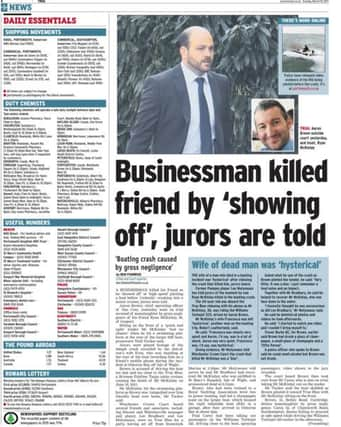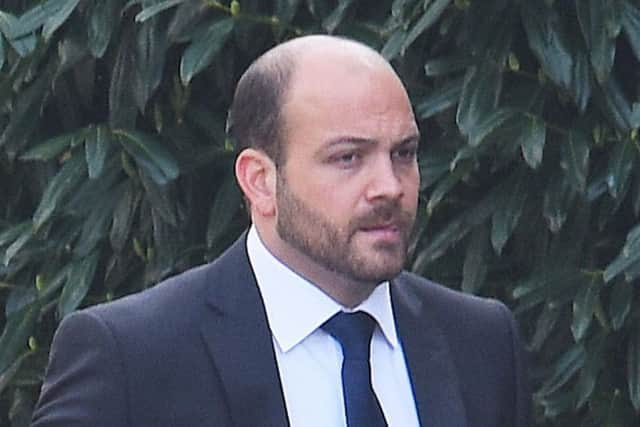Accused in fatal boat crash trial told widow: '˜Wheel wouldn't turn'


Video played to the jury of a voluntary interview showed how Aaron Brown sobbed as police spoke to him at Southampton police station.
The successful businesssman, chief operating officer of One Com, is on trial at Winchester Crown Court accused of the manslaughter by gross negligence of Ryan McKinlay, 36, from Gosport, after crashing a Williams Turbojet 325 into a larger boat, the True Blue.
Advertisement
Hide AdAdvertisement
Hide AdA statement read to jurors from his widow Francesca told how Brown said to her the ‘wheel wouldn’t turn’ on the boat he was piloting at the time of the crash.


On the second day of the trial, jurors were shown four brief clips by Brown’s barrister Trevor Burke QC.
In a written statement read out by his solicitor, Theresa Tang, Brown said: ‘Ryan was one of my best friends. I have known him for over 20 years.
‘I can’t believe he is no longer here. I’m in shock.’
Dad-of-one Mr McKinlay died on June 19, 2015, in Osborne Bay, off the Isle of Wight, when a Williams Turbojet 325 tender piloted by Brown ‘violently’ crashed into the larger boat True Blue, where a party of more than a dozen were gathered.
Advertisement
Hide AdAdvertisement
Hide Ad

Brown is accused of driving the smaller boat too fast and too close, causing the death of his friend Mr McKinlay, prosecutor Nick Tucker has told jurors.
Yesterday Mr Tucker told jurors that Brown told Mr McKinlay’s widow Francesca that the ‘wheel wouldn’t turn’.
In a police statement read by Mr Tucker, she said: ‘On the evening of June 19 I went to St Mary’s Hospital, which is where Ryan was taken to and after he had been confirmed as having died.
‘I recall speaking to Aaron Brown in a room at the hospital. I recall very clearly that I asked Aaron what had happened.
‘He said to me the “wheel wouldn’t turn”.
Advertisement
Hide AdAdvertisement
Hide Ad‘I’m sure that he said this twice and while he said this he was crying.
‘I remember that he had a bump or a cut on his head.
‘He was sitting down and I was standing up. I was slightly looking down at him and his head was on to the left side of my chest and I had an arm around him.’
Jurors were told the crash led to Mr McKinlay hitting the swimming platform at the back of the True Blue, causing fatal chest injuries.
Outlining the case on Monday, Mr Tucker said Brown had ‘shown off’.
Advertisement
Hide AdAdvertisement
Hide AdHe said: ‘He chose to pilot the boat towards a 38-tonne cruiser at something like 30mph with his friend sitting at the front of the boat and hanging on, and as a result Ryan McKinlay was killed.’
Brown, 34, of Botley Road, Curdridge, denies manslaughter by gross negligence.
The skipper hired for the day Paul Carey, 52, of Chatsworth Road, Southampton, denies a charge of driving too fast contravening Merchant Shipping regulations, in relation to earlier driving of the Williams Turbojet 325 the same afternoon.
ONLY BOAT OUT OF THOUSANDS LIKE IT TO BE IN ‘MAJOR INCIDENT’
Advertisement
Hide AdAdvertisement
Hide AdThe water jet-powered boat piloted by Aaron Brown was the only one out of thousands made by a manufacturer that has been in a ‘major incident,’ jurors were told.
Matthew Hornsby, from Oxfordshire-based Williams Perfomance Tenders said of around 3,000 to 4,000 Williams Turbojet 325s made by his firm, no others had been involved in a major incident.
He told jurors the boat was powered by an intake of water that was used as a jet to propel the boat, as opposed to a propeller-based powerboat.
In statements, Mr Hornsby said ‘you could easily lose control’ by de-throtting the Williams Turbojet 325 quickly.
Advertisement
Hide AdAdvertisement
Hide AdGiving evidence, Mr Hornsby said a warning sticker was also on the boats to read the owner’s manual, which warned about the difference in how the water jet-powered boat operates compared to a propeller-based boat.
Asked about ‘buzzing’, when the boat is driven to send up a spray of water, Mr Hornsby said: ‘If your intention is to throw up a curtain of spray the procedure is to drive past the object, you don’t point the boat at it.’
He said the tender had a top speed of 44mph, but this cut to in the 30s with one passenger.
FRIENDS SWAPPED MESSAGES AHEAD OF FATAL TRIP
Friends swapped messages with plans ahead of the fatal boating trip, a jury heard.
Advertisement
Hide AdAdvertisement
Hide AdWhatsApp messages between Aaron Brown and Ryan McKinlay, sent in the days before the crash, were read to the jury yesterday.
‘The Williams Jet is fun though. Last time the rope got caught underneath it,’ one message from Brown said.
Another from Brown, 34, said: ‘I was thinking Osborne Bay for some fun and a couple of drinks in Cowes before heading back.’
Jurors were told on Monday the pair had been friends for 20 years.
Advertisement
Hide AdAdvertisement
Hide AdThe court also heard from Andrew Cross, who taught Brown on a two-day RYA level two powerboating course in September 2012, which he said was a ‘fundamental basic’ course.
The training took place on an 8.5m-long propeller-powered powerboat.
Mr Cross said: ‘I would have talked about the importance of leaving a wide berth from other vessels or objects because if you get too close you might hit something.’
Asked by Trevor Burke QC, defending Brown, if the training he gave would prepare Brown for the jet rib, Mr Cross said: ‘Yes.’
Advertisement
Hide AdAdvertisement
Hide AdHe added: ‘You should go somewhere safe and understand how it handles differently before you put yourself in danger.’
Mr Cross had trained both Brown and the defendant’s father on the boat on the Hamble and central Solent.
(Proceeding)